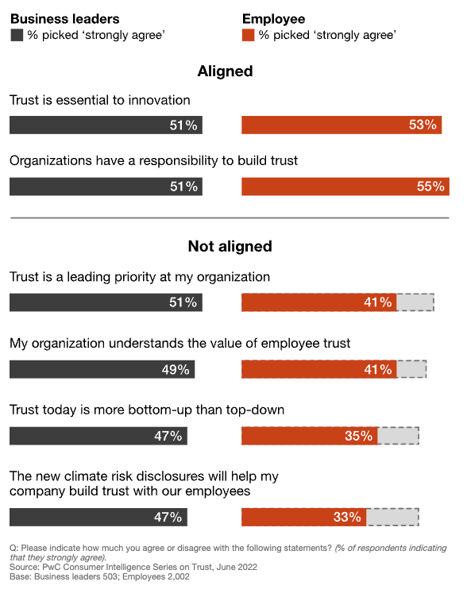Do Consumers Now Consider Ads More Trustworthy Than News?
A survey conducted for MediaPost by Brand Keys has confirmed a media-trust nosedive, referring to...

A recently released survey from PwC shows that most businesses think they are more trusted by consumers and employees than they actually are.
This is a dangerous trust disconnect, and businesses need to be aware of the impact it can have on their bottom line.
Losing trust can have a significant negative effect on customer revenue and employee loyalty, so businesses must invest in active strategies to foster trust.
In this blog post, we will look at the results of the study and give you some practical tips on how to start building brand trust effectively so that it works in your favor!
Content overview:
PricewaterhouseCoopers ‘PwC’, the global accounting and consulting firm, surveyed 503 business executives, 2,002 employees, and 2,508 consumers in the United States from April 2022 to May 2022.
Wes Bricker, vice chair at the firm, highlighted a glaring gap between the trust consumers and employees have in organizations on one hand, and the trust business executives think consumers and employees have in their companies on the other hand.
With unforeseeable circumstances aside like the COVID-19 pandemic, accusations of price gouging, and the ongoing inflation, we are faced with a new reality: there is a clear dichotomy in trust perception between businesses and their customers and employees. This is what we call the trust disconnect.
In short, the trust disconnect is the gap between how trusted companies think they are, and how trusted companies are by consumers and employees in reality.
Before we dive into depth into the how and why of the trust disconnect, let’s first take a look at some important results of the PWC trust study.
We first want to highlight some results concerning the trust disconnect between companies and consumers. After this, we'll highlight the results concerning employees.
87% of surveyed business leaders highly believe that their company is trusted by consumers. However, only 30% of surveyed consumers trust companies, resulting in a 57-point trust gap.
When asked how much trust consumers have in certain industries compared to a year ago, PwC found that consumers trust companies less. 37% of surveyed consumers trust the public service sector less. The technology, media, and telecom industry was greatly affected too with 33% of consumers trusting the companies less. The data shows that the health industry is affected at 24%, the financial services industry at 22%, the energy and utilities industry at 22%, the private equity industry at 20%, the industrial products industry at 17%, and the consumers market industry at 17%.
For example, 51% of business leaders believe that their organizations understand the value of consumer trust, while only 33% of consumers think the same. This 18-point gap is significant and proves the presence of a trust disconnect.
Now let's highlight some key results concerning the trust disconnect between companies and employees.
Just like with consumers, business leaders overestimate how much employees trust them. 84% of surveyed business leaders believe that their company is trusted by employees. However, only 69% of surveyed employees trust companies, resulting in a 15-point trust gap.

51% of surveyed business leaders hold that trust is a leading priority in their organizations, but only 41% of employees feel the same. Next to that, 49% of business leaders maintain that their company understands the value of employee trust, but the 8-point gap shows that employees do not completely agree.
While 87% of business executives swear that their stakeholders trust their companies, only 30% of consumers and employees said the same. Therefore, what are the roots of the trust disconnect? Why are consumers and employees finding it harder to trust corporations?
PWC asked consumers about the most important steps that a company can take to earn their trust as a consumer. Here are the top seven answers:
With consumers, the affordability of products and services is extremely important when trying to earn their trust: 34% of consumers ranked affordability as their top priority. With the supply chain issues that started affecting the life of the normal citizen, price surges, and the ongoing global inflation, this result is no surprise.
Effectively, the pandemic shifted the emphasis from long-time goals to the short-term reality of many Americans looking to stretch their dollar. While consumers are trying to pay off credit card debt and save for an emergency fund, affordability is naturally a top priority when choosing a company.
Ranking as number two is how companies treat their employees. Naturally, with employees being consumers themselves most of the time, business executives should pay close attention to this employee-consumer connection. Therefore, executive decisions should always be taken with this consideration in mind if a company is wanting to earn the trust of its employees and consumers.
While companies are investing in social and racial equity, being a good corporate citizen, and focusing on climate issues to improve their trust with consumers, they are effectively ignoring what consumers find important. A company’s employment practices can impact trust and shapes brand perception; similarly, if consumers think that your prices are unfair, trust is broken.
Therefore, while business executives are overestimating how much consumers trust their organizations, and by actively working on issues that consumers rank low in importance, the trust disconnect becomes evident.
In the survey, employees were asked about the most important steps that a company could take to earn their trust. Here are the top seven answers:
Naturally, how a company treats its employees is the number one factor in building trust according to the employees themselves. Providing flexible schedules, respecting staff, paying fair wages, and recognizing accomplishments might simply be the key to retaining new hires. With 47% of employees choosing this reason as the number one factor, business owners should reconsider their executive decision when targeting employees: it is quite simple to gain the trust of your employees.
Whether a company discloses on their website their carbon emissions or switches to plastic-free has little to no repercussions on employee trust. The PWC survey has clearly shown why the trust disconnect exists: companies are focusing on issues that employees rank low in importance.
-png.png)
Building trust with consumers and employees is extremely important for a company: according to the survey, individuals that trust the company are more likely to recommend and buy from it, think highly of the business and defend it to others, share information on social media and be loyal to the company.
When it comes to employees, PWC showed in a previous study that 22% of surveyed workers have left a company because of issues related to trust. Therefore, bridging the trust disconnect does not only boost sales, but also impacts talent acquisition and retention.
First and foremost, your trust strategy needs to align with your company profile and ethos. This alignment can’t happen without being proactive about drafting a corporate framework to build trust with stakeholders. Every position can and will impact consumer and employee behavior.
Here’s a guide that targets new companies wishing to establish trust with their stakeholders: 10 Proven Ways to Establish Trust When Starting a New Business.
Creating a culture of trust in your organization where employees feel safe, are heard, and have their needs met is essential for employee retention. Not only that, but if you reflect your company values to your employees, they will reflect it back to consumers.
We’re no longer in the industrial revolution of the 18th century, and employees need to feel that there's meaning to their work. Whether your company invests in a grandiose project has little effect on their individual experience, and consequently on their morale. Therefore, to win the trust of your employees, you need to provide them with choices that add purpose to their labor.
When asked to rank the stakeholder groups in terms of importance to the company, 59% of business leaders stated that consumers are their priority, followed by: employees, investors, suppliers, policymakers, regulators, community, and lastly media and industry analysts.
However, a common mistake that business leaders make is treating all stakeholders the same: what matters to suppliers does not ring a bell with consumers. Therefore, providing personalized attention to every stakeholder, depending on their identity tension points and priorities, is essential to build trust.
Building trust doesn't happen overnight – this is why you need to be patient, and you need to be persistent. By enthusiastically listening to your stakeholders, implementing suggestions, and eliminating concerns, you'll actively be fighting the trust disconnect.
However, it is advised to have risk management strategies put in place in case of a trust crisis.
Mohamed Kande, the vice-chair of PWC, noted that “it is much easier to lose trust than to gain it.” Therefore, business leaders need to be proactive when it comes to trust management by actively listening to stakeholders and focusing on foundational elements that resonate with consumers and employees.
Simply speaking, offering affordable products and services and treating employees well can go a long way. We understand that building trust takes effort, commitment, and time, but, Trust Signals is here to fight the trust disconnect by bringing knowledge to you.
Here are a few recommended readings to start building brand trust:
Perla is a doctoral student at Notre Dame Law School. She loves writing and sharing knowledge with others.

A survey conducted for MediaPost by Brand Keys has confirmed a media-trust nosedive, referring to...

If you've been following the news lately, you've probably noticed that the public keeps clashing...
Leave a Comment